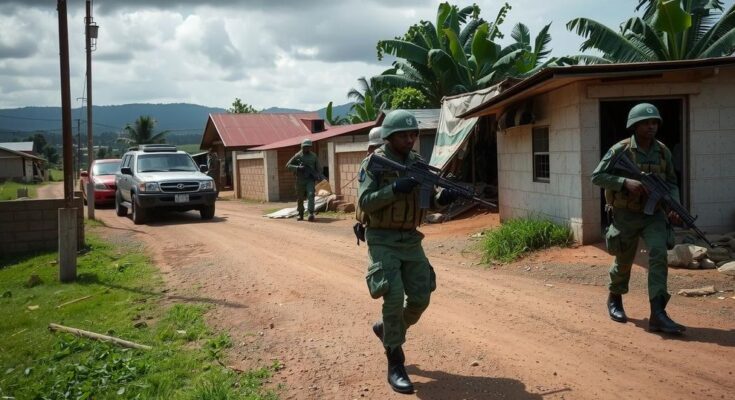Rwanda-backed M23 rebels have captured the town of Masisi in eastern DRC, marking significant territorial gains and escalating humanitarian concerns. This follows their recent acquisition of the nearby town of Katale. Diplomatic efforts to address the conflict have stalled, with accusations against Rwanda regarding its military involvement and exploitation of resources in the region. The situation highlights acute humanitarian crises resulting from ongoing violence.
Rebels affiliated with Rwanda have successfully seized the town of Masisi in eastern Democratic Republic of Congo (DRC), according to multiple reports. This marks the M23 group’s second territorial acquisition within two days, following their capture of the town of Katale. Since its resurgence in 2021, the M23 has gained control over significant portions of eastern DRC, resulting in substantial displacement, with hundreds of thousands fleeing their homes.
Angola has previously attempted to mediate peace discussions between Congolese President Félix Tshisekedi and Rwandan President Paul Kagame; however, such dialogues collapsed last month. Alexis Bahunga, a member of the North Kivu provincial assembly, expressed profound concern regarding the humanitarian impact of Masisi’s capture, urging enhancements in military capacity for the government. Residents reported that the M23 convened a meeting in Masisi, articulating their self-declared mission to ‘liberate the country.’
Masisi, now under M23 control, serves as the capital for its respective territory and is situated approximately 80 kilometers north of Goma, the provincial capital of North Kivu. In 2012, the M23 briefly occupied Goma, leading to fears of a renewed advance toward the city last year, although a respite in hostilities was observed until December. Notably, a United Nations report acknowledged the presence of around 4,000 Rwandan soldiers operating alongside the M23, with Rwanda accusing the Congolese government of insufficient action amid ongoing regional conflict. The M23, which emerged as a splinter group to protect the Tutsi populace, faces allegations of exploiting eastern DRC’s rich mineral resources for economic gain, exacerbating regional tensions. Additionally, the DRC’s recent legal actions against corporations over the sourcing of conflict minerals signify the ongoing complexity of this multifaceted crisis.
The Democratic Republic of Congo has experienced enduring conflict, particularly in its eastern regions, driven by ethnic tensions, rebel movements, and lucrative mineral resources. The M23 group claims to act in defense of Tutsi populations but is criticized for perpetuating violence and economic exploitation. Rwanda’s involvement, including military support for the M23, has exacerbated diplomatic tensions between the two nations. Efforts to mediate peace have been challenging, as evidenced by the recent breakdown of talks facilitated by Angola. The humanitarian crisis resulting from these hostilities continues to affect vast numbers of civilians.
In summary, the seizure of Masisi by Rwanda-backed M23 rebels represents a significant escalation in the ongoing conflict in eastern Democratic Republic of Congo. As the situation evolves, the humanitarian implications are severe, prompting urgent calls for military reinforcement and international intervention. The intertwining of regional politics, historical grievances, and economic interests underscores the complexities of fostering lasting peace in the DRC.
Original Source: www.bbc.co.uk




